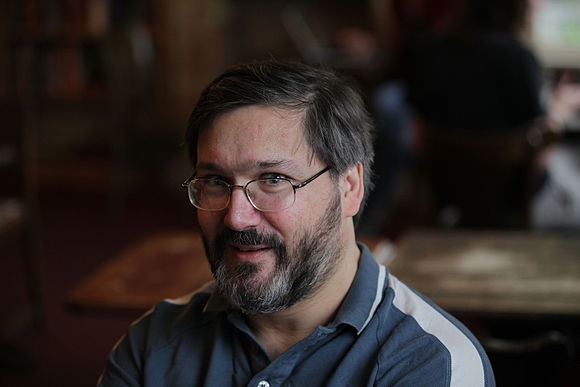Rich has made more than a million total edits to Wikipedia. Photo by Stephen B Streater, freely licensed under CC-BY 3.0.
| “ | The English Wikipedia should be considered a storehouse of resources. Given the ubiquity of the language, anyone with even a passable command of English can make a valuable contribution to Wikipedias in other languages. Not just in articles, policies, and guidelines, but also in the wide reuse of templates—saving thousands of hours. | ” |
In my effort to interview leading Wikipedians in different languages, I approached Rich Farmbrough, a leading English Wikipedian in terms of edit count with over a million edits to his personal credit, in addition to several million bot-assisted edits.
Rich developed a passion for English Wikipedia the moment he discovered the project as early as 2004. A supporting factor for Rich was his prior experience on bulletin boards. “From about March 2012, with some gaps, I have been a full-time Wikipedian,” he says.
Born and brought up in the London borough of Enfield, Rich holds a degree in Mathematics. His professional pursuits resulted in diverse roles such as a professional in car insurance, e-commerce and academia. On the personal front, Rich is a family man with a wife and grown up children.
As a proactive contributor on Wikipedia, Rich has made several analytical studies related to the project. He’s looked at the number of pages under different namespaces and the percentage of source bytes in each namespace. He is especially concerned about the ratio of male to female editors on Wikipedia over the years.
As well as his studies, Rich is of course heavily involved in editing Wikipedia. He has created articles for monuments and statues in southern England, improved the coverage of the Abbots of Shrewsbury, and still creates redirects from pseudonyms. He is technically sound, and has worked on bots and templates for Wikimedia projects as well as external sites. And it’s not just English that Rich is interested in.
“To investigate the difficulties of working with other languages, I needed a language that I didn’t have any familiarity with,” he says. “I have always been interested in Swahili, but knew virtually nothing about it. I found the Swahili community small but very welcoming. I was able to create some stubs for Tanzanian politicians, and later for places in Botswana. Actual translation, even in a limited way, will need some significant work.”
He also helped in providing missing templates, especially for the Nepali, Newari and Swahili Wikipedias.
Rich has heavily contributed to a variety of different projects across Wikimedia sites, and is keen on working further. Some of these include his work on WikiProject Ghana, tagging GFDL maps with the correct license, filling gaps on the Rainbow List (a list of the most influential LGBT people in the UK), correcting ISO 639 language codes, creating an exhaustive list of viruses, cleanup of ISBNs in articles, as well as fixing spellings, combating vandalism, and correcting formatting and hyphenation.
But despite everything Rich has achieved on Wikipedia, he remains a humble and open-minded person. He is keen on enlisting new editors, and has participated in a number of meetups and outreach events. Rich ended his interview in true Wikipedian style, with a message for new editors: “Be bold, be patient and be kind,” he says—the three quintessential traits which inevitably lead to initiative, cooperation, and a constructive approach to any Wikimedia project.
Syed MuzammiluddinWikimedian

Can you help us translate this article?
In order for this article to reach as many people as possible we would like your help. Can you translate this article to get the message out?
Start translation
